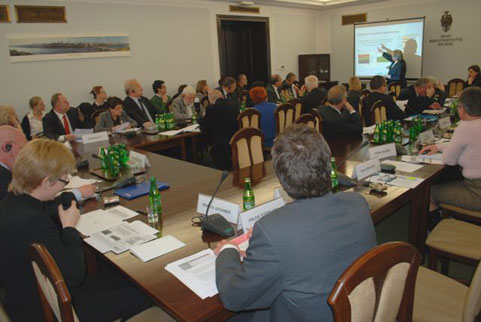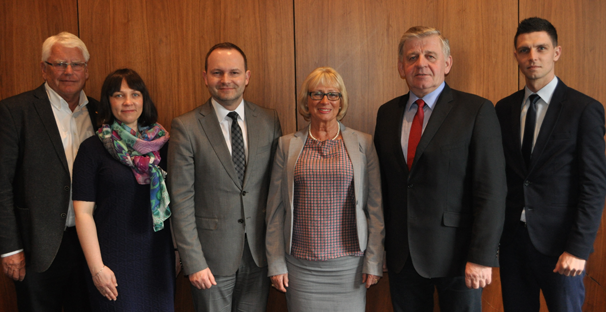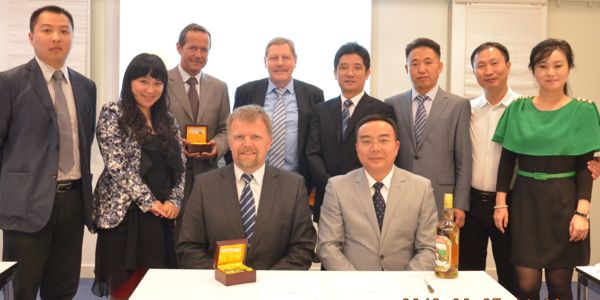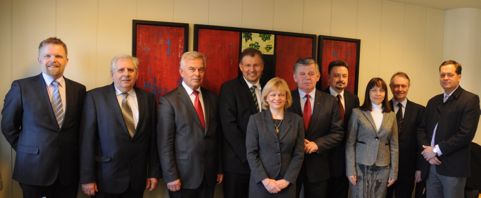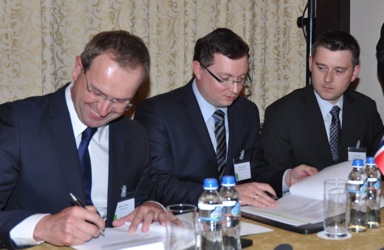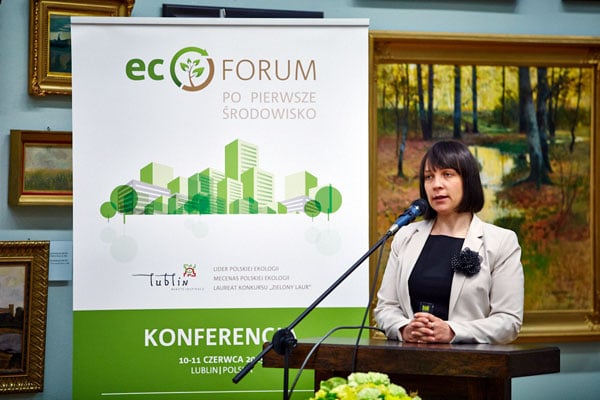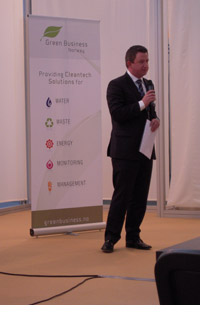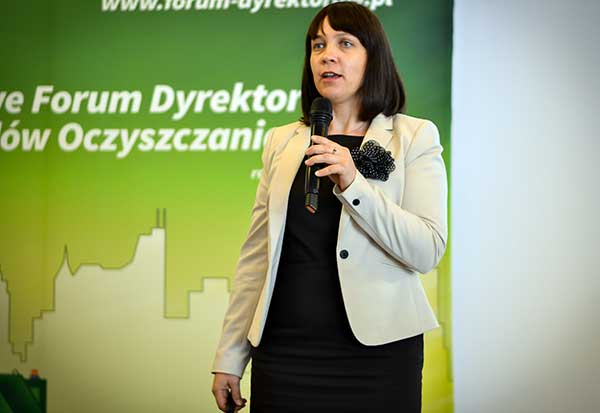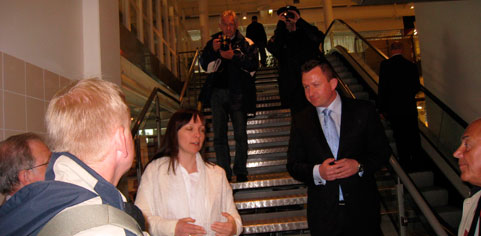Telemark–Lubelskie partnership centres on green business
A delegation from the Lubelskie region visited Telemark last week. After a tour of the county, Sławomir Sosnowski, governor of the Lubelskie region, and Terje Riis-Johansen, convener of Telemark county council, signed a wide-ranging cooperation agreement between the two regions.
The sun emerged from the clouds as the two farmers from Lubelskie in Poland and Telemark in Norway stood at the sixth-floor window of the county headquarters gazing out over the fields of Gjerpensdalen. Mr Sosnowski and Mr Riis-Johansen both expressed concern for the grain harvest following recent rainstorms.
Complementary regions
It soon became apparent at last week’s bilateral meeting hosted by the county that the leaders of the two regional governments share an all-consuming interest in agriculture. Lubelskie and Telemark are both major agricultural regions with a strong economic focus on green technology. For instance, the Norwegian company TergoPower is investing in groundbreaking biomass technology for generating clean energy from straw produced by Lubelskie’s farms.
Mr Sosnowski expressed appreciation for the work that went into drawing up the agreement:
– I am especially grateful to Green Business Norway, which has worked very hard to get this partnership off the ground. As I travel around the Lubelskie region, the local projects instigated by Green Business Norway frequently come up in conversation.
– This agreement strengthens the influence of Green Business Norway in transnational environmental issues, said Einar Vangsnes, chairman of GBN, after Thursday’s bilateral meeting. He highlighted Norwegian relationships with the town of Biłgoraj and the city of Lublin in the Lubelskie region.
Mr Riis-Johansen noted that, on his last visit to Lublin in 2014, he had seen many tangible results of the partnership between the two regions.
A green future without borders
The inter-regional agreement covers cooperation across a wide range of sectors, from environmental protection, waste management and renewable energy, to economic development and entrepreneurship, to education, tourism, healthcare and the arts.
With dedicated funding for inter-regional cooperation available from the European Union, a number of joint projects are already under way.
Youthful, international entrepreneurship
Examples of EU-funded projects include the partnership between Porsgrunn Upper Secondary School and Lublin’s Vetter School of Economics, and the exchange program between Telemark University College and Lublin University of Technology.
Kristine Rubilar, head of department at Porsgrunn Upper Secondary, described her school’s positive experiences to date:
We’re currently drawing up an application for Erasmus+ funding, which will facilitate exchanges between Vetter and Porsgrunn, and in early 2016 we’ve invited a delegation from Vetter to attend the Young Entrepreneurship show here in Grenland.
Jan Freddy Gusfre, vice-principal of Porsgrunn Upper Secondary School, explained that the entrepreneurship education partnership would initially focus on tourism and the environment.
The idea is that the young entrepreneurs from Poland and Norway should make their destinations mutually appealing by promoting attractions that resonate with people their own age.
In this way, the youth entrepreneurship program plays another important role, by raising awareness among young people of what is going on in the partner country. In turn, this will make that country a more attractive option for them when they start applying to universities and colleges.
Academic exchanges under way
For the past three years, Telemark University College has welcomed exchange students from Lublin University of Technology. Among those attending the seminar that followed the signing ceremony was Michal Sposob, who was an exchange student some years ago and has now returned to Telemark to complete his PhD. Mr Sposob’s doctoral thesis on water and wastewater treatment is being sponsored by Yara, a Porsgrunn-based company.
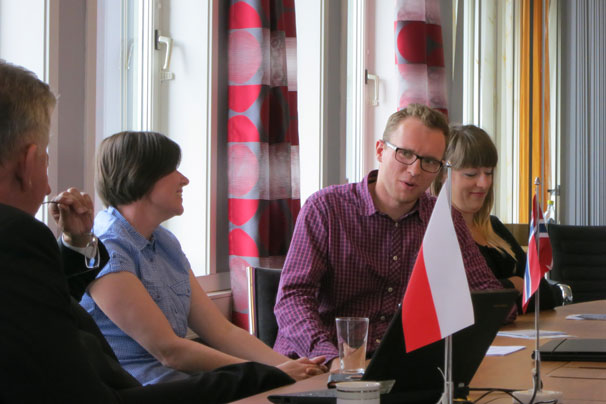
Michal Sposob from Lublin is a research fellow at Telemark University College. His doctoral thesis is being sponsored by Yara.
The structure of the programs at Telemark University College suits me really well, said Mr Sposob. There are fewer lectures than we have in Poland, so we have more time to immerse ourselves in the subject and read up on it independently.
Magdalena Tarnowska from Lublin University of Technology is in charge of the exchange program with Telemark University College. At the seminar, she introduced Mr Sposob as the product of a successful partnership, adding that the exchange program would expand to other fields of study in future.
Espen Johansen, an adviser at Telemark University College, said the college was planning to offer more lectures in English, opening up a wider range of study options for Polish students in Porsgrunn.
The partnership between Lublin University of Technology and Telemark University college is funded via the Norwegian Financial Mechanism.
Lublin – a university city in an agricultural region
Lublin, the capital of the Lubelskie region, is home to five universities and two world-class research institutes for rural healthcare and veterinary medicine. Green Business Norway is taking soundings with a view to expanding research collaboration in these areas.
We already have a great deal to thank this inter-regional partnership for, said Mr Sosnowski, emphasizing the importance of TergoPower’s investment in his region. Not only will this new technology ensure a reliable and sustainable electricity supply, but it also brings on board the farmers in our agricultural region.
TergoPower has a major role to play in diversifying the Lubelskie region’s sources of energy, said Mr Riis Johansen in conclusion. I am confident that we will discover new ways of working together as the process continues.
Green Business Norway is coordinating the inter-regional partnership between Telemark in Norway and Lubelskie in Poland.
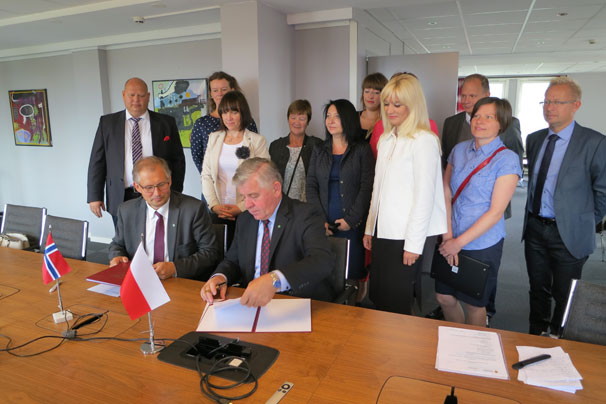
The signing of the agreement. Behind Terje Riis-Johansen, convener of Telemark county council, and Sławomir Sosnowski, governor of the Lubelskie region, are the teams that laid the groundwork for the agreement. From left: Einar Vangsnes, chairman of Green Business Norway; Kristine Rubilar, head of department at Porsgrunn Upper Secondary School; Anna Larsson, GBN’s market director for Poland; Anne Marie Fatnes, research director at Tel-Tek; three staff members from Lublin University of Technology; Małgorzata Błaszczyk, deputy chief of staff in the Lubelskie regional governor’s office; Magdalena Tarnowska, development director at Lublin University of Technology; Espen Johansen, adviser at Telemark University College; Jan Freddy Gusfre, vice-principal of Porsgrunn Upper Secondary School.
Also present but not pictured were Krzysztof Buczyński, international relations adviser with the Lubelskie regional government, and Trond Kjellevold, senior international relations adviser at Telemark county council.






















